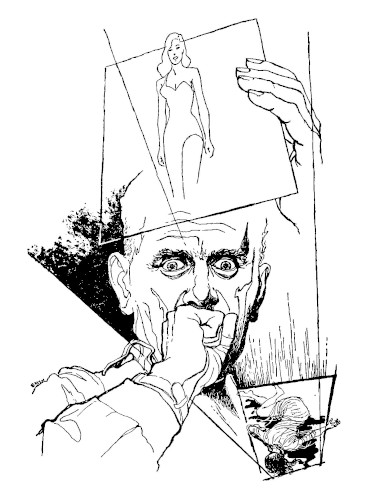"Death in Transit."
By Jerry Sohl (1913-2002).
Illustration by Emsh (1925-90; HERE).
First appearance: Infinity Science Fiction, June 1956.
Reprints page (HERE).
Short story.
Online at The Luminist Archives (HERE; original text: 17 pages; PDF; scroll down to text page 60) and at Project Gutenberg (HERE; 14 pages as a PDF).
"There was one, and only one, thing Clifton could do. Even so, he made the worst of 100 possible choices!"
Robinson Crusoe had Friday to alleviate his loneliness and Sleeping Beauty had a handsome prince to bring her love, but Cliff doesn't have Karen, and that makes all the difference . . . .
Principal characters:
~ George Hedstrom:
". . . a dark, handsome fellow who wore a quizzical look."
~ Karen West:
"For one thing there was the stereo room where Karen loved to spend leisure hours. He never saw much in stereo, but she seemed to enjoy it. And there was the music taperoom, the massage parlor, the baths. She seemed to have a need of them . . ."
~ Clifton West:
". . . I intended no harm. If only you knew the loneliness—"
~ Portia Lavester:
"You're always saying things so seriously, Cliff. So—so pontifically. Is that the word?"
References and resources:
- "the hundred people who lay as if dead in neat rows in the sleep locker":
"Short of a warp or em drive, there is no viable option for keeping humans alive during long-distance space travel, making cryogenic sleep’s possibilities the most tempting, promising way to snooze our way to another planet" (Inverse HERE).
"Hibernation and suspension are often encountered in SF novels where large numbers of people have to be shipped, e.g., troop carriers, slave ships, and undesirable persons shipped off as involuntary colonists to some miserable planetary colony. Some passenger liners will have accommodations of First-class, Second-class, and Freeze-class (instead of Steerage). There is often a chance of mortality associated with hibernation and suspension. In some of the crasser passenger ships there will sometimes be a betting pool, placing bets on the number of freeze-class passengers who don't make it. Poul Anderson noted that there is probably a limit to how long a human will remain viable in cryogenic suspension (in other words they have a shelf-life). Naturally occurring radioactive atoms in the body will cause damage. In a non-suspended person such damage is repaired, but in a suspended person it just accumulates. He's talking about this damage happening over suspensions lasting several hundred years, during interstellar trips. This may require one to periodically thaw out crew members and keep them awake for long enough to heal the damage before re-freezing them" (Atomic Rockets HERE).
- "the medocenter did most of the work":
"Sickbay, also known as the dispensary or the medbay, was the main medical center
. . ." (Memory Alpha HERE).
- "she walked in her sleep":
"Sleepwalking, also known as somnambulism or noctambulism, is a phenomenon of combined sleep and wakefulness. It is classified as a sleep disorder belonging to the parasomnia family. It occurs during slow wave stage of sleep, in a state of low consciousness, with performance of activities that are usually performed during a state of full consciousness" (Wikipedia HERE).
- "He could have utilized the synthesizer for anything really bad, like a shattered bone. The needles of the organic analyzer would have told him what else he had to do":
Regarding medicine in science fiction, SFFnal authors have been there for a long time; see Technovelgy (HERE) for a list.
- When it came to incorporating scientific concepts into his fiction, it could be hit or miss
16 credits).
~~~~~~~~~~~~~~~~~~~~~~~~~~~~~~~~~~~~~~~~~~~~~~~~~~~~~~~~~~~~~~~~~~~~~~~~~




No comments:
Post a Comment